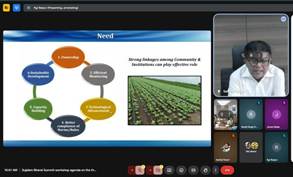Ministry of Jal Shakti
Departmental Summit on the Vision for Sujalam Bharat – Thematic Workshop on Community and Institutional Engagement for Behaviour Change
Posted On:
01 OCT 2025 7:59PM by PIB Delhi
Ministry of Jal Shakti is the nodal ministry for taking forward the Departmental Summit on Vision for Sujalam Bharat through collective efforts towards rejuvenating rivers; grey water reuse; use of technology for efficient water management. In the sequence, an online workshop on “community and institutional engagement for behavioral change”, was organized today, which was attended by States and Union Territories (UTs) from across the country. The session began with a welcome address by Sh. Pratul Saxena, Member Secretary, CGWA and Project Director, Atal Bhujal Yojana. In her opening remarks, Ms. Archana Varma, Additional Secretary & Mission Director, National Water Mission (NWM), clearly conveyed the objective of such workshops is to gather inputs from the grassroots level in the states regarding the issues, challenges, and policy barriers for further necessary action at central level.

Sh. Pratul Saxena, the Nodal Officer for the workshop, made a presentation on the theme Community & Institutional Engagement for Behavioural Change, outlining the concept, key issues, challenges, and the way forward. He also highlighted important schemes in India that adopt community and institutional engagement as a core approach to water management. This was followed by state-specific presentations from Meghalaya, Gujarat, Andhra Pradesh, Karnataka, Odisha, Maharashtra, and Telangana, along with a presentation from M. S. Swaminathan Research Foundation (MSSRF), Chennai.
The presentations delivered by the States and the expert organization highlighted the best practices and innovative approaches to efficient water conservation and management through community and institutional engagement. Meghalaya showcased participatory planning through village councils blending traditional and modern practices. Gujarat presented Water User Associations and the Sechai Salahkar Samiti for equitable irrigation, while women farmers from Mehsana shared how community-led efforts rejuvenated local water sources. Andhra Pradesh emphasized Jal Shakti Kendras and the Magic Drain initiatives. The state suggested linking Gram Panchayat-level planning (commenced annually on 2nd October) with water budgeting on 22nd March (World Water Day) to create a sustained planning cycle. Karnataka highlighted the need to strengthen local bodies and engage NGOs for capacity building and community mobilization. The state urged that the government must encourage NGOs in community-led schemes. Maharashtra shared Participatory Water Security Plans, Groundwater Information Centres and how it has helped in water budgeting and also village level competitions, and Farmer Camps, etc. Telangana demonstrated rainfall-based groundwater recharge strategies. Ms. Rengalakshmi, Executive Director, MSSRF, underscored effective convergence, judicious use of MGNREGS funds, and climate change impacts on groundwater. She also highlighted the effective factors that can help in community and institutional engagement for behaviour change in sustainable water management.

Women leaders Meenakshi Ben Panchal and Lilaben Patel from Mehsana, Gujarat detailed their experience of declining ground water in their area and facing issues due to water shortage. How mobilizing women for water monitoring, water testing, and management helped address a shortage of groundwater.

The workshop concluded with Dr.Sudershan Sahu summarizing key take-aways and thanking participants for their insights and contributions, reaffirming the importance of community institutions, grassroots leadership, and state-driven innovations in realizing the vision of Sujalam Bharat.
***
MAM/AK/SMP
(Release ID: 2173862)
Visitor Counter : 63